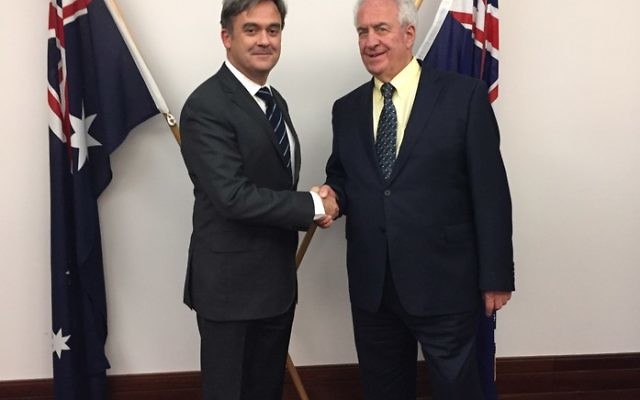Anti-Israel motion scuppered
TEARS were shed at a moving ceremony in Sydney last Sunday, when Jewish federal MP Julian Leeser presented certificates to 12 descendants of Indigenous men who served in Australian Light Horse brigades during the WWI Sinai-Palestine campaign.
A BID last week to push South Australia’s upper house into urging unconditional recognition of a Palestinian state has been thwarted and replaced by a far more balanced motion.
The original motion stated that it “acknowledges that Palestinians have suffered denial of their rights, “recognises that Palestinians have been victims of massive dispossession”, “acknowledges that Palestinians have suffered under an Israeli occupation for 50 years”, and called on Israel “to end its occupation of the Palestinian territories”; and on the Commonwealth government “to recognise the state of Palestine”.
But the motion, put forward by Greens MP Tammy Franks, was amended by Liberal MP Andrew McLachlan, calling “on both sides to resume direct negotiations in good faith” and “on the Commonwealth government to recognise the state of Palestine once the two sides have successfully negotiated a two-state solution, as required by international law”.
Addressing the chamber, McLachlan said the unamended motion “cuts across the federal Liberal government’s position of support for a two-state solution”, adding the Turnbull government “encourages peace in the region and acknowledges that it is for the parties to negotiate a settlement … My argument is that Palestinians of all factions must reject violence, and that the Israelis must negotiate in good faith”.
McLachlan’s motion was passed, with the support of Nick Xenophon Team’s John Darley, and the other two motions were defeated.
McLachlan told The AJN he had been unhappy with Franks’ motion blaming Israel for the conflict and demanding immediate, unconditional Australian recognition of Palestine.
He was also dissatisfied with ALP MLC Kyam Maher’s motion placing most of the blame on Israel, while recommending a timetable towards recognition.
These motions were “not federal government foreign policy” and were “also deeply challenging to the Jewish community in South Australia and nationally”, said McLachlan.
“That motivated me to put a motion that I think was even-handed and satisfactory to the community in general.”
“I’m disappointed that the chamber had to be put into a position to, in effect, take sides, and bring international disputes into our multicultural community,” he said.
McLachlan said while the upper-house motion does not override the Legislative Assembly’s June 22 motion, which in effect asks Canberra to recognise Palestine unconditionally, “it has equal force”.
Welcoming the adopted motion, Executive Council of Australian Jewry executive director Peter Wertheim said it supports an outcome “that arises out of a binding peace agreement between the Palestinians and Israel. This reflects Israel’s official position”.
Jewish Community Council of South Australia president Norman Schueler, who canvassed MPs before the vote, told The AJN the upper-house result offers a counterpoint to South Australia’s lower-house resolution in June.
“With the enormous help of the enthusiastic Liberal members of the upper house, we were able to achieve this aim,” he said.
“In our discussions with MPs, they were horrified once they realised the linkage between Hamas and Palestinians and also realised the cruelty inflicted on Israel.”
AIJAC executive director Colin Rubenstein, who was in the chamber to witness the vote, said: “Credit goes especially to Andrew McLachlan of the Liberal Party – with help from other Liberal members, Cory Bernardi’s Australian Conservatives, and John Darley of the Nick Xenophon Team [who cast the deciding vote] – for his leadership in steering the passage of this sensible and constructive resolution.”
Zionist Federation of Australia president Danny Lamm lauded McLachlan’s amendment as “consistent with positions outlined by successive Australian governments from both sides” and the support of Darley.
South Australia will host next year’s national ALP conference when the Palestine recognition issue will come to a head.
Resolutions backing unconditional recognition of Palestine have been passed at state and territory ALP conferences in the ACT, Queensland and Tasmania, with the WA ALP to vote on it this month.
A resolution at the NSW ALP conference last month passed with amendments assuring “the recognition and right of Israel and Palestine to exist within secure and recognised borders”.
PETER KOHN


comments